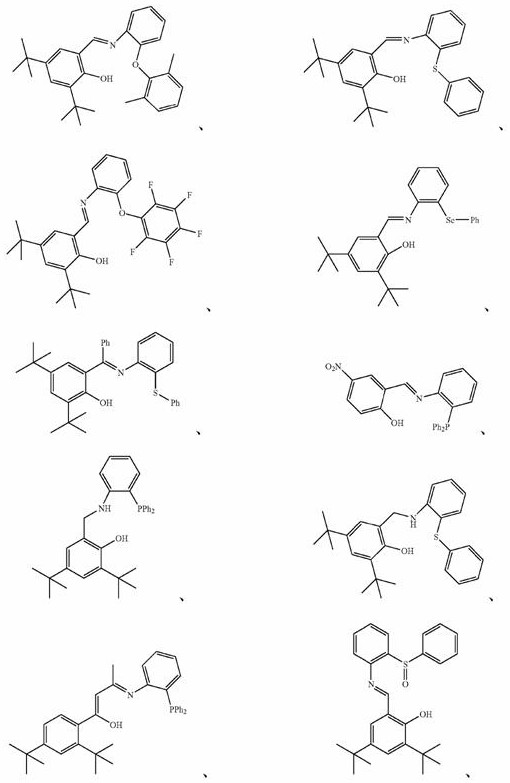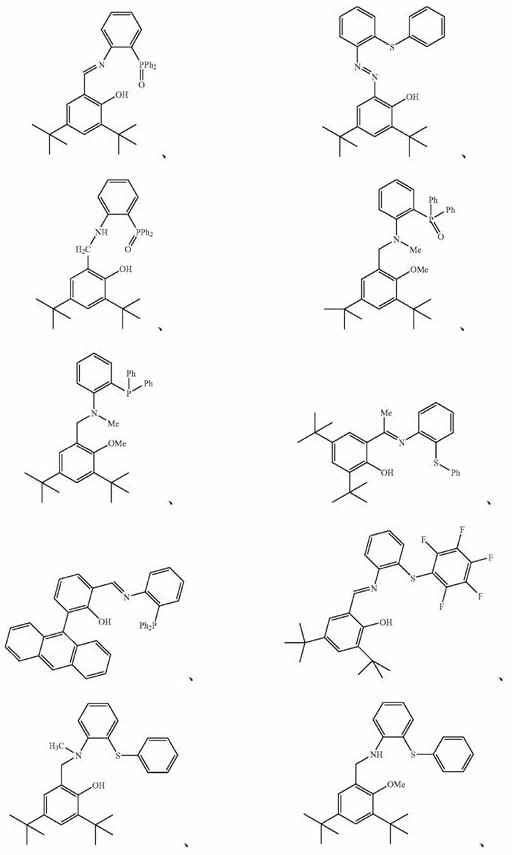Ultra-high molecular weight polyethylene, its production method and its application
A technology of ultra-high molecular weight and polyethylene, applied in the field of copolymerized ultra-high molecular weight polyethylene, can solve the problem that it is difficult to obtain ultra-high molecular weight polyethylene with good chain transfer characteristics, and it has not reached the conventional level of ultra-high molecular weight polyethylene, and the maximum is only 8.72 dl and other problems, to achieve the effects of easy molding processing and application, no obvious activity attenuation, low loss of wear resistance and impact strength performance
- Summary
- Abstract
- Description
- Claims
- Application Information
AI Technical Summary
Problems solved by technology
Method used
Image
Examples
preparation example Construction
[0092] According to Chinese patent CN200910210989.8, the preparation method of the preferred supported non-metallocene catalyst of the present invention is disclosed, which includes the following steps: dissolving the magnesium compound and the non-metallocene ligand in a solvent to obtain a magnesium compound solution; The step of drying the magnesium compound solution to obtain a modified carrier; and the step of treating the modified carrier with a chemical treatment agent selected from group IVB metal compounds to obtain the supported non-metallocene catalyst.
[0093] The steps for obtaining the magnesium compound solution are specifically described below.
[0094] Specifically, the magnesium compound (solid) and the non-metallocene ligand are dissolved in an appropriate solvent (ie, a solvent for dissolving the magnesium compound), thereby obtaining the magnesium compound solution.
[0095] As the solvent, for example, C 6-12 Aromatic hydrocarbons, halogenated C 6-12 Sol...
Embodiment 1
[0279] The magnesium compound adopts anhydrous magnesium chloride, the solvent for dissolving the magnesium compound and the non-metallocene ligand adopts tetrahydrofuran, and the chemical treatment agent adopts titanium tetrachloride. The non-metallocene ligand adopts the structure compound of.
[0280] Weigh 5g of anhydrous magnesium chloride and non-metallocene ligands, add tetrahydrofuran solvent and dissolve completely at room temperature, stir for 2 hours, heat to 60°C and directly vacuum-dry to obtain a modified carrier.
[0281] Then add 60ml of hexane to the modified carrier, add titanium tetrachloride dropwise for 30 minutes under stirring conditions, stir and react at 60°C for 4 hours, filter, wash with hexane twice, and use 60ml of hexane each time, Vacuum drying at room temperature to obtain a supported non-metallocene catalyst.
[0282] The ratio of magnesium chloride to tetrahydrofuran is 1mol: 210ml; the molar ratio of magnesium chloride to non-metallocene ...
Embodiment 1-1
[0285] Basically the same as Example 1, but with the following changes:
[0286] Non-metallocene ligands use , the solvent for dissolving magnesium compounds and non-metallocene ligands was changed to toluene, and the chemical treatment agent was changed to zirconium tetrachloride (ZrCl 4 ), the magnesium compound solution was vacuum-dried at 90 °C.
[0287] The ratio is as follows: the ratio of magnesium compound to toluene is 1mol:150ml; the molar ratio of magnesium compound to non-metallocene ligand is 1:0.15; the molar ratio of magnesium compound to chemical treatment agent is 1:0.20.
[0288] Supported non-metallocene catalysts are designated CAT-2.
PUM
| Property | Measurement | Unit |
|---|---|---|
| density | aaaaa | aaaaa |
| density | aaaaa | aaaaa |
Abstract
Description
Claims
Application Information
 Login to View More
Login to View More - R&D
- Intellectual Property
- Life Sciences
- Materials
- Tech Scout
- Unparalleled Data Quality
- Higher Quality Content
- 60% Fewer Hallucinations
Browse by: Latest US Patents, China's latest patents, Technical Efficacy Thesaurus, Application Domain, Technology Topic, Popular Technical Reports.
© 2025 PatSnap. All rights reserved.Legal|Privacy policy|Modern Slavery Act Transparency Statement|Sitemap|About US| Contact US: help@patsnap.com



